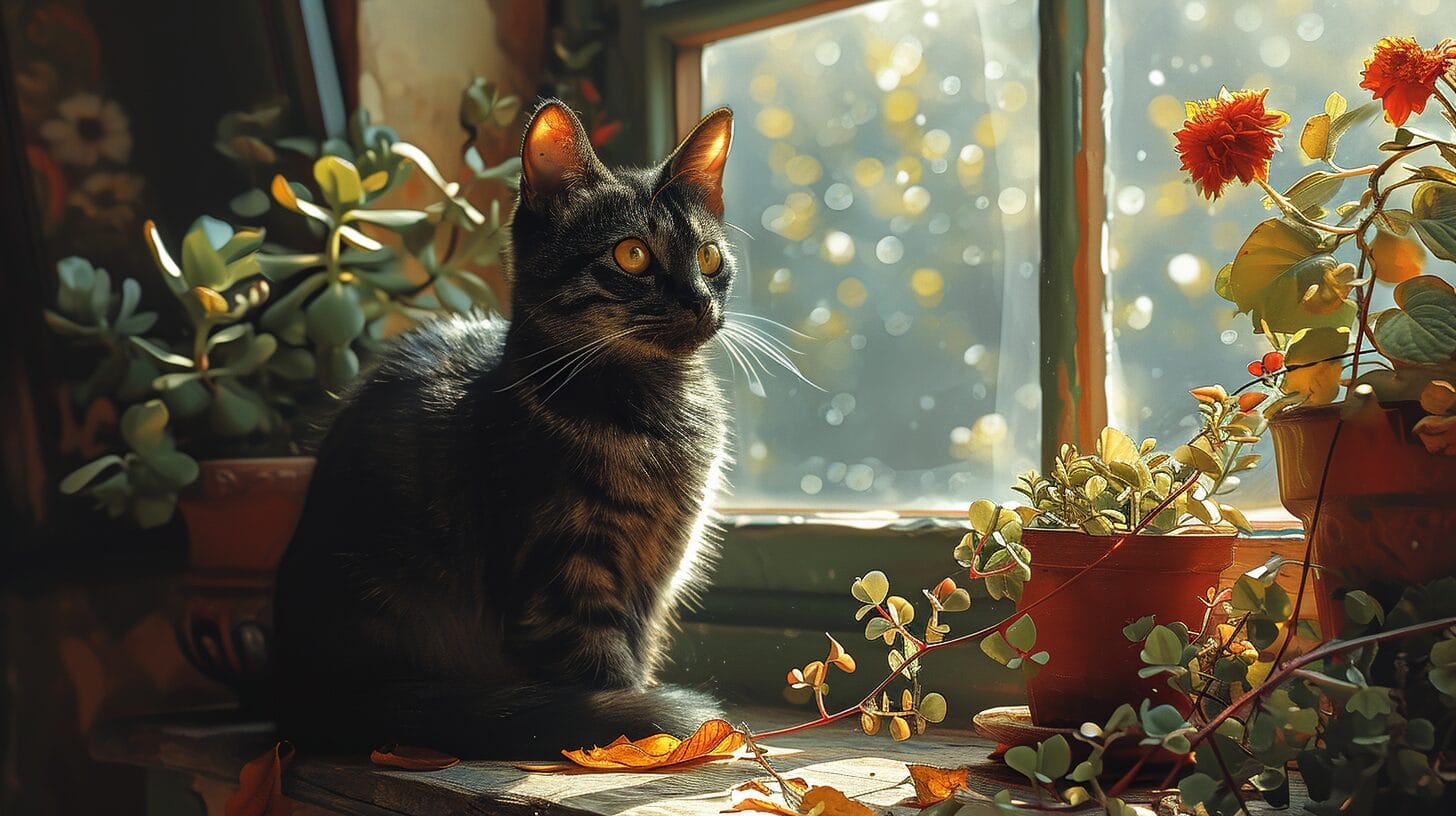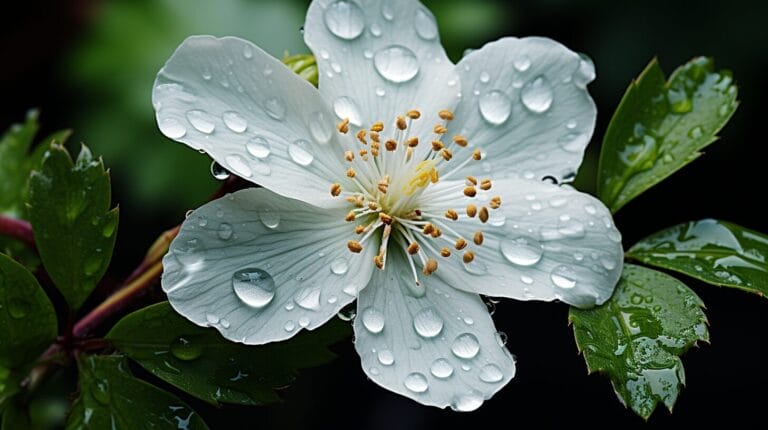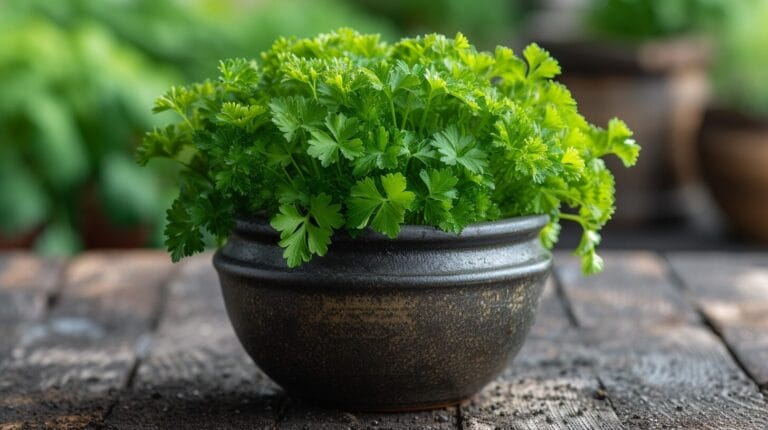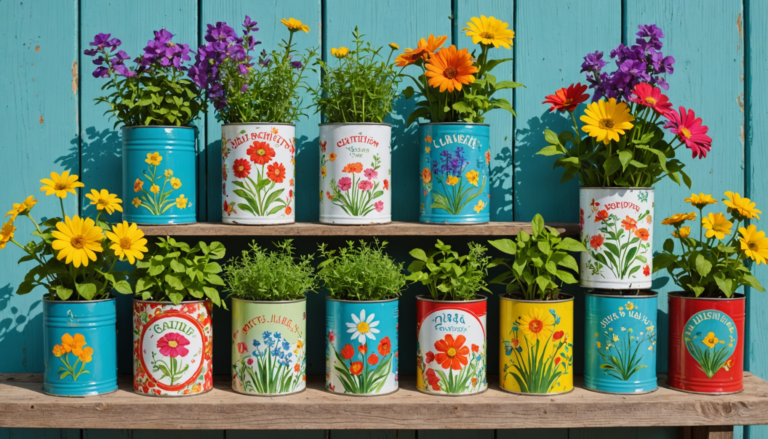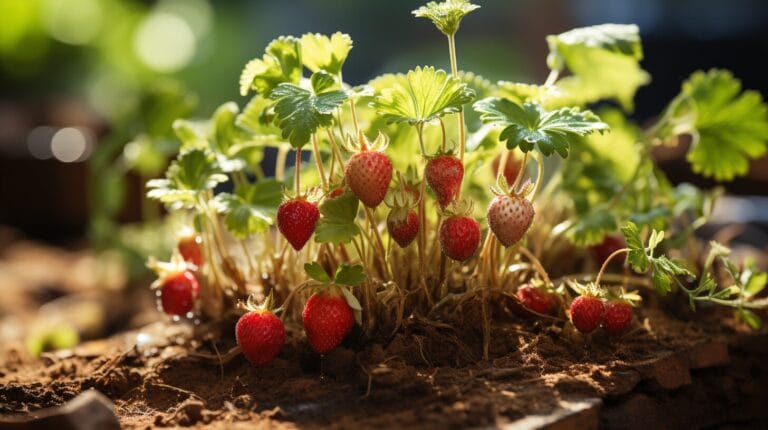Picture your home as a peaceful sanctuary, complemented by the lush, green foliage of a ZZ plant ushering in a serene environment, while your cherished pet cat blissfully savors a cozy sunbeam. Nonetheless, as a cat owner, it’s possible that you might be concerned about your cat’s wellbeing if they come in contact with the ZZ plant, which is harmful to cats.
The ZZ plant, also known as the eternity plant, while low maintenance and air-purifying and a part of many plant collections, is mildly toxic and rumored to be toxic to cats. Before introducing this plant, which may be extremely toxic to home buddy cats, it’s important to determine the truth. Let’s explore the ZZ plant’s impact on cats, how to keep a ZZ plant in a pet-friendly environment, and keep your pets away.
Key Takeaways
- ZZ plants contain calcium oxalate crystals that are toxic to cats if ingested.
- Ingestion of ZZ plants can cause irritation and discomfort in the mouth, throat, and stomach of cats.
- Symptoms of ZZ plant ingestion in pets or children include drooling, vomiting, and difficulty swallowing.
- To keep cats safe, ZZ plants should be kept out of reach, and natural deterrents or designated plant-free zones can be used to discourage cats from approaching them.
Understanding ZZ Plants: A Popular Houseplant and Its Toxicity
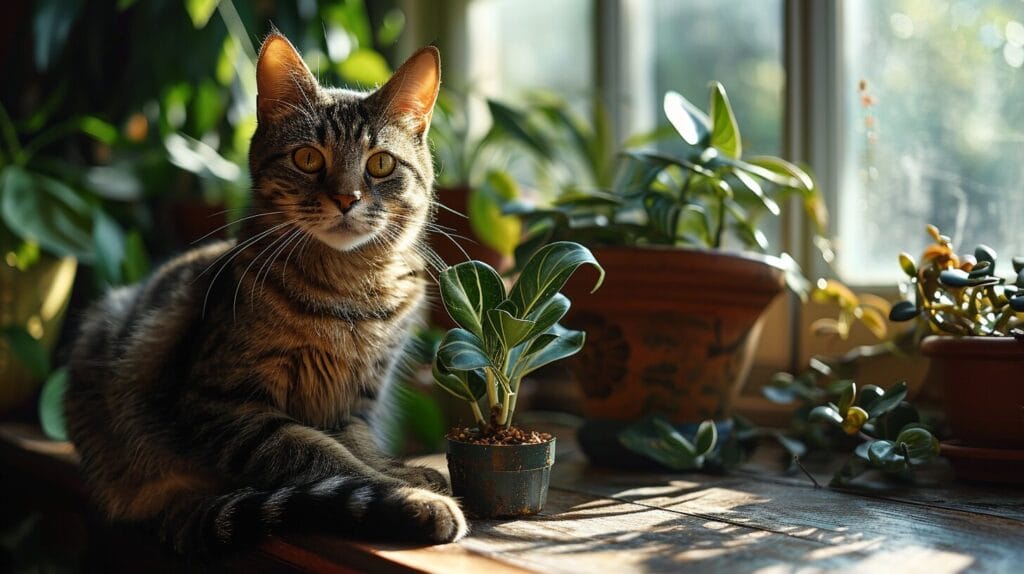
Zamioculcas zamiifolia plants, also known as ZZ plants, contain calcium oxalate crystals, which are toxic if ingested by cats or pets in general. They’re known for attractive, waxy leaves and the ability to grow in low-light conditions but bear in mind that ingesting the plant causes toxicity. ZZ plants are poisonous to cats.
If a cat chews on the leaves or stems, the needle-like crystals can irritate the mouth, throat, and stomach. Symptoms of ingestion include as follows:
- drooling
- vomiting
- difficulty swallowing
These can happen if the plant is ingested by the pet. The severity of ZZ plant poisoning in cats varies, but it’s essential to keep your pets away from the plant and consider pet-friendly alternatives for safety. If you have a ZZ plant in your home and also have cats, it’s important to keep the plant out of their reach. Place it somewhere out of reach.
ZZ Plants and Cats: Understanding the Toxicity
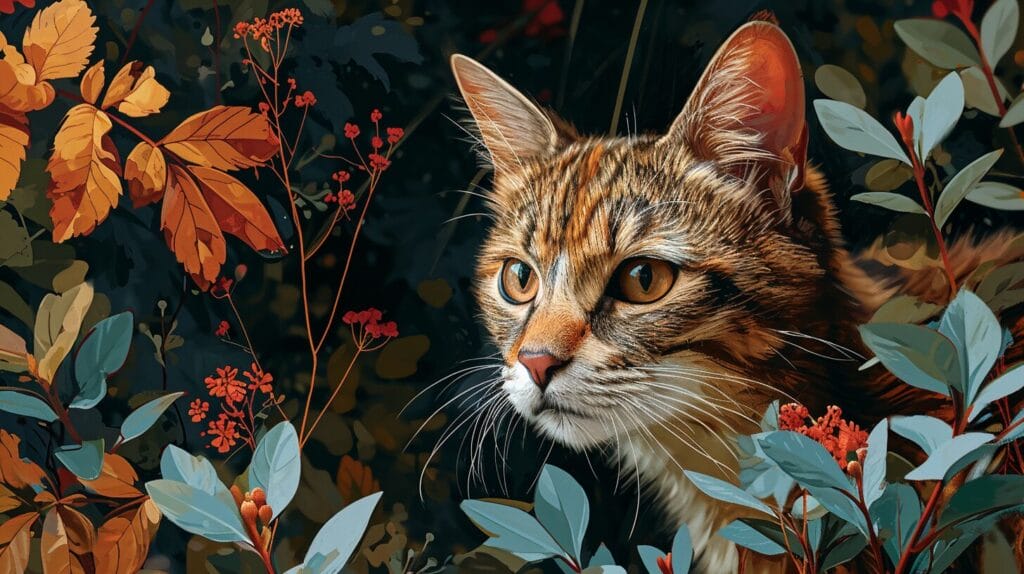
ZZ plants brighten homes with minimal care, but their leaves, stems, and roots contain harmful substances for cats. The sap of the plant contains insoluble calcium oxalate crystals which are extremely toxic and can cause immediate oral irritation and health problems.
Ingesting parts of a ZZ plant may lead to the following symptoms, indicative of ZZ plant poisoning:
- Burning sensation
- Swelling may occur if the base of the plant is chewed on by pets.
- Discomfort in a cat’s mouth
- Severe symptoms may include vomiting
- Difficulty swallowing, or respiratory issues due to swelling
- While not usually life-threatening, it can cause significant distress.
Act swiftly if your cat ingests part of a ZZ plant, as the ZZ plant is poisonous to cats. If your pet ingests part of a ZZ plant, remove plant material from their mouth, offer water, and contact your vet for guidance on dealing with potential toxicity from ingesting the plant.
Keeping Cats Safe Around ZZ Plants: Tips and Strategies

To protect your cats from ZZ plants:
- Place ZZ Plants out of reach as the plant is part of the toxic ones for pets: Use high shelves or hanging planters.
- Use Cat Repellents: Apply citrus peels or pet repellent sprays as deterrents.
- Create a Plant-Free Zone: Establish areas where cats won’t encounter ZZ plants.
- Monitor Your Cats: Keep an eye on your cats when they’re around ZZ plants as these plants are toxic to cats, make sure they don’t nibble on them.
- Provide Alternative Greenery: Offer your cats their cat-friendly grass or plants to chew on.
- Educate Your Cats on not ingesting the plant. Train your cats to stay away from ZZ plants using positive reinforcement and techniques to keep cats away, such as redirection.
- Consult a Veterinarian: If you suspect your cat has ingested the ZZ plant, seek immediate veterinary care, because ingesting the plant can be toxic to cats.
Responding to ZZ Plant Exposure
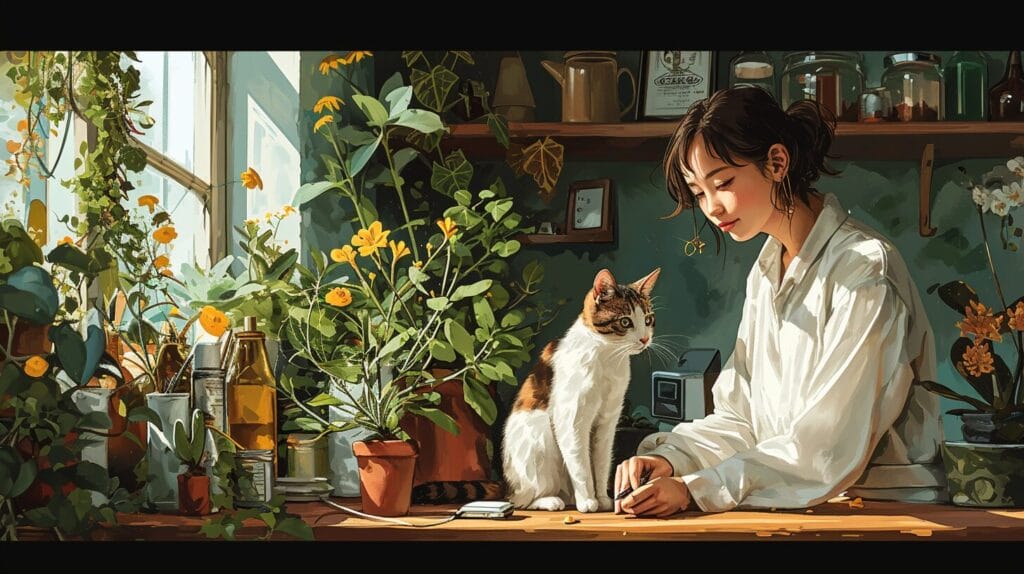
If your cat ingests parts of the ZZ plant, a toxic plant to cats:
- Should your cat ingest the sap of the ZZ plant, remove the toxic plant material from the cat’s mouth immediately.
- Observe the symptoms of ZZ plant toxicity. like drooling or vomiting.
- Contact your vet or poison control center. Follow their instructions carefully as plants are toxic to cats and they may instruct to induce vomiting or administer specific antidotes to the ZZ plant poisoning in cats.
- Keep your pet calm and comfortable.
- If you suspect a ZZ plant poisoning, take your pet to the vet immediately. For further examination and treatment if your pet shows symptoms of ZZ plant toxicity.
In the future, ensure the safety of the ZZ plants poisonous to cats by keeping the houseplants out of reach of pets to prevent ingestion.
Alternatives to ZZ Plants and Other Pet-Friendly Houseplants
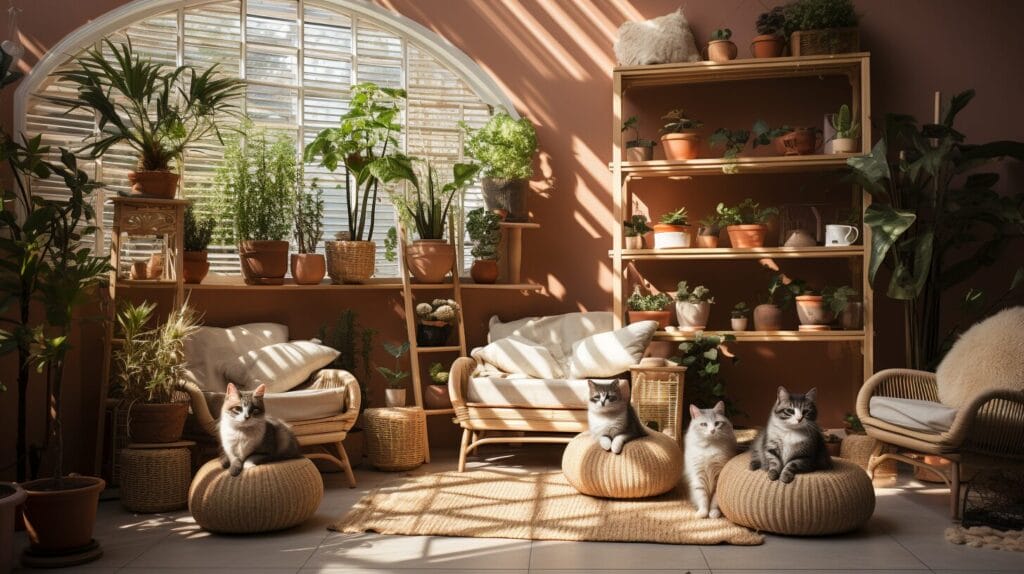
For a cat-safe home, consider these non-toxic plants:
- Spider Plant (Chlorophytum comosum)
- The Boston Fern (Nephrolepis exaltata) is a safer choice for houses with pets and children, unlike the extremely toxic ZZ plant, or eternity plant.
- Areca Palm (Dypsis lutescens)
Additionally, cat grass, unlike some of the plants that are toxic to cats such as the ZZ plant, provides safe, edible enjoyment for cats and can deter them from other houseplants.
- African Violet (Saintpaulia)
- Parlor Palm (Chamaedorea elegans)
- Bamboo Palm (Chamaedorea seifrizii)
- Calathea (Calathea spp.)
It’s important to note that even pet-friendly plants can cause mild gastrointestinal upset if ingested in large quantities, so it’s always best to monitor your pets around any houseplants and seek veterinary care if you suspect they have consumed large amounts.
Conclusion
ZZ plants are stylish but they’re poisonous plants and pose risks to children and pets, particularly cats. Be vigilant and deter your cat from the plant. Opt for pet-safe alternatives to ensure a harmonious living space for you and your pet. With proper precautions, such as keeping your ZZ plant away from the reach of children and pets, you can maintain a pet-friendly environment.
Frequently Asked Questions
Are ZZ plants toxic to cats?
Yes, the ZZ plant is part of the group of plants that are considered toxic to cats. The substance causing the toxicity is calcium oxalate crystals found in all parts of the plant.
What makes the ZZ plant toxic?
The ZZ plant is toxic due to the presence of calcium oxalate crystals in its sap. This substance is considered poisonous to both humans and pets including cats and dogs.
How can I keep my cats away from ZZ plants?
To keep your cats away from ZZ plants, consider placing the plant in a location that your cat can’t reach. Alternatively, you can invest in pet-friendly plants for your plant collection that won’t harm your cat if ingested.
Can I have a ZZ plant in my home if I have a cat?
If you own a cat, you may still keep your ZZ plant in your home, provided that you take the necessary precautions to prevent the cat from ingesting the plant. However, you should ensure the plant is placed out of reach of your cat or invest in pet-friendly plants instead. Take note that the ZZ plant is also toxic to dogs.
Is there any alternative to ZZ plants that is safe for cats?
Yes, there are many alternatives to ZZ plants that are safe for cats. Some pet-friendly indoor plant collections include spider plants, Swedish ivy, Boston ferns, and some varieties of palms, but the ZZ plant, also known as the eternity plant, doesn’t fit into this non-toxic category.

